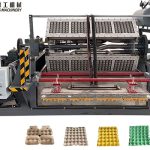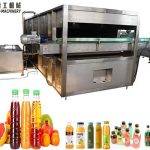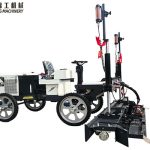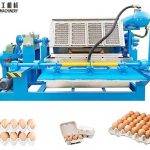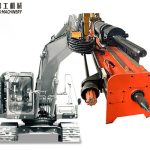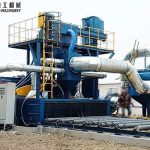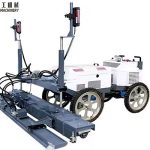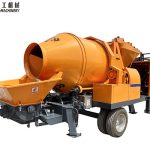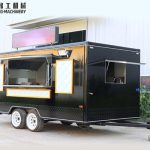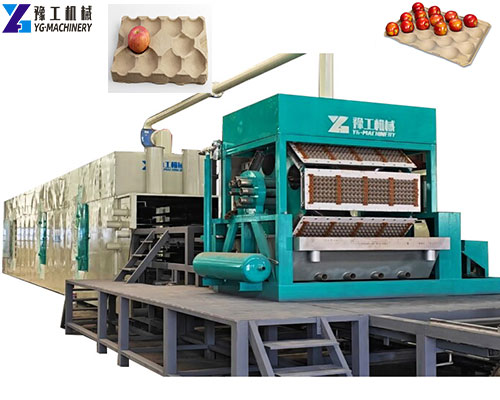

For fruit and vegetable processors or large packaging companies, the key to investment lies in whether the equipment can bring substantial returns on investment and long-term market competitiveness in the shortest possible time. Simply reducing packaging costs is no longer sufficient to meet market challenges; you need a versatile piece of equipment that can expand your business scope and provide stable added value. The value of the YG apple tray making machine lies not only in its efficient production of apple trays, but also in its ability to easily handle the production needs of pear trays, tomato trays, and even expand into the lucrative egg tray making machine market through quick mold changes. This multi-functional flexibility allows your equipment to operate at high capacity under different seasons and market demands, maximizing asset utilization. Furthermore, due to low raw material costs and a highly automated production process, this apple tray making machine can recoup its initial investment in a very short period and generate continuous, stable, high profits through the sale of environmentally friendly packaging products. If you are also interested in investing, please contact us now to learn more about the equipment.【WhatsApp/WeChat/Phone/Skype】+86 136 1385 6800
Egg Tray Production Line Specification and Consumption
| Production Line Models | Output (p/h) | Hydraulic Pulper | Egg Tray Machine | Drying Method | |||
| Natural Drying | Brick Drying Line | Single-layer Metal Drying Line | Multilayer Metal Drying Line | ||||
| YGDT3×1-1000 | 1000 | ZDS1(1m³) | DTF3×1 | √ | √ | √ | √ |
| YGDT4×1-1500 | 1500 | ZDS1(1m³) | DTF4×1 | √ | √ | √ | √ |
| YGDT3×4-2000 | 2000 | ZDS1(1m³) | DT3×4 | √ | √ | √ | √ |
| YGDT4×4-2500 | 2500 | ZDS2(2m³) | DT4×4 | √ | √ | √ | √ |
| YGDT3×8-3000 | 3000 | ZDS2(2m³) | DT3×8 | √ | √ | √ | |
| YGDT4×8-4000 | 4000 | ZDS4(4m³) | DT4×8 | √ | √ | √ | |
| YGDT5×8-5000 | 5000 | ZDS4(4m³) | DT5×8 | √ | √ | √ | |
| YGDT5×12-6000 | 6000 | ZDS6(6m³) | DT5×12 | √ | √ | √ | |
| YGDT6×8-7000 | 6000-7000 | ZDS6(6m³) | DT6×8 | √ | √ | √ | |
| Production Line Models | Drying Method | Raw Material(kg/h) | Power(kW/h) | Fuel Consumption | ||||
| Paper | Water | Coal(kg/h) | Gas(m³/h) | Diesel(kg/h) | LPG(kg/h) | |||
| YGDT3×1-1000 | Natural drying | 85 | 255 | 23.6 | ||||
| YGDT3×1-1000T | Brick drying line | 36.1 | 50 | 22-32 | 18-28 | 18-28 | ||
| YGDT3×1-1000J1 | Single-layer metal drying line | 36.1 | 22-32 | 18-28 | 18-28 | |||
| YGDT3×1-1000J6 | Multilayer metal drying line | 36.1 | 22-32 | 18-28 | 18-28 | |||
| YGDT4×1-1500 | Natural drying | 102 | 306 | 27.3 | ||||
| YGDT4×1-1500T | Brick drying line | 38.6 | 60 | 26-36 | 22-32 | 22-32 | ||
| YGDT4×1-1500J1 | Single-layer metal drying line | 38.6 | 26-36 | 22-32 | 22-32 | |||
| YGDT4×1-1500J6 | Multilayer metal drying line | 38.6 | 26-36 | 22-32 | 22-32 | |||
| YGDT3×4-2000 | Natural drying | 170 | 510 | 32.6 | ||||
| YGDT3×4-2000T | Brick drying line | 45.3 | 83 | 37-47 | 30-40 | 30-40 | ||
| YGDT3×4-2000J1 | Single-layer metal drying line | 45.3 | 37-47 | 30-40 | 30-40 | |||
| YGDT3×4-2000J6 | Multilayer metal drying line | 45.3 | 37-47 | 30-40 | 30-40 | |||
| YGDT4×4-2500 | Natural drying | 212 | 636 | 34.2 | ||||
| YGDT4×4-2500T | Brick drying line | 46.8 | 104 | 46-56 | 38-48 | 38-48 | ||
| YGDT4×4-2500J1 | Single-layer metal drying line | 46.8 | 46-56 | 38-48 | 38-48 | |||
| YGDT4×4-2500J6 | Multilayer metal drying line | 46.8 | 46-56 | 38-48 | 38-48 | |||
| YGDT3×8-3000T | Brick drying line | 255 | 765 | 88.9 | 125 | 56-66 | 46-56 | 46-56 |
| YGDT3×8-3000J1 | Single-layer metal | 88.9 | 56-66 | 46-56 | 46-56 | |||
| YGDT3×8-3000J6 | Multilayer metal drying line | 88.9 | 56-66 | 46-56 | 46-56 | |||
| YGDT4×8-4000T | Brick drying line | 340 | 1020 | 91 | 160 | 67-77 | 55-65 | 55-65 |
| YGDT4×8-4000J1 | Single-layer metal drying line | 91 | 67-77 | 55-65 | 55-65 | |||
| YGDT4×8-4000J6 | Multilayer metal drying line | 91 | 67-77 | 55-65 | 55-65 | |||
| YGDT5×8-5000T | Brick drying line | 424 | 1272 | 100 | 185 | 82-92 | 67-77 | 67-77 |
| YGDT5×8-5000J1 | Single-layer metal drying line | 100 | 82-92 | 67-77 | 67-77 | |||
| YGDT5×8-5000J6 | Multilayer metal drying line | 100 | 82-92 | 67-77 | 67-77 | |||
| YGDT5×12-6000T | Brick drying line | 510 | 1530 | 105 | 208 | 92-103 | 77-87 | 77-87 |
| YGDT5×12-6000J1 | Single-layer metal drying line | 105 | 92-103 | 77-87 | 77-87 | |||
| YGDT5×12-6000J6 | Multilayer metal drying line | 105 | 92-103 | 77-87 | 77-87 | |||
Notes:
|
||||||||
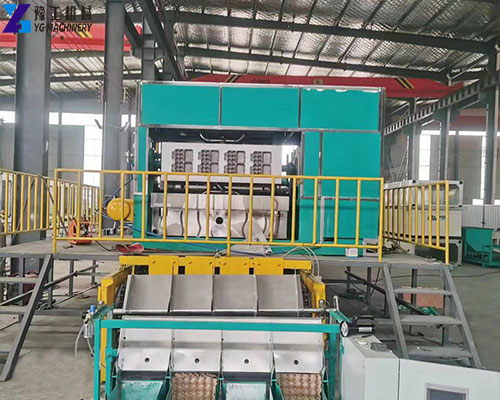
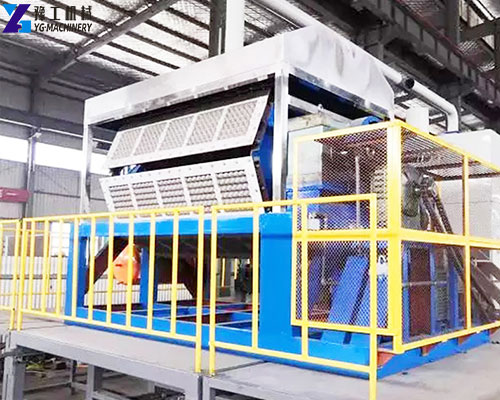
YG Apple Tray Making Machine Features
- High Capacity and High Automation: Utilizes a large rotary drum forming machine, configurable with 4, 8, or 12-sided molds, achieving a high output of 2000 to 10000 pieces per hour.
- Strong Mold Interchangeability: Standardized mold design allows for simple and quick mold replacement. By changing molds, it can flexibly produce apple trays, pear trays, wine bottle trays, and pulp egg trays.
- High-Efficiency and Energy-Saving Drying System: Employs a multi-layer, fully enclosed design, utilizing heat recovery technology to reduce energy consumption by more than 25% compared to traditional drying ovens. It can use various energy sources such as natural gas, diesel, and steam.
- Pulp Water Circulation System: All wastewater generated during production is recycled (over 95%) after sedimentation and filtration, achieving closed-loop resource utilization.
- Remote Monitoring and Fault Diagnosis: Equipped with a PLC intelligent control system and a touchscreen interface, it can monitor the operating status of each stage in real time and supports remote fault diagnosis.
YG Apple Tray Making Machine Application Areas
- Fruit and Vegetable Wholesale: Large-scale apple orchards and fruit and vegetable processing centers, used for packaging and grading various fruits such as apples, pears, and peaches.
- Poultry and Egg Farming: By changing the mold, it can be used in large-scale poultry and egg farms to quickly produce egg trays, achieving automated packaging in conjunction with egg packaging machines.
- Industrial and Medical Product Packaging: Used to produce disposable trays for electronic products, fragile items, or medical equipment, replacing foam plastics.


Customers in Mexico and Nigeria Purchase YG Egg Tray Machines
Case Study 1: Environmental Upgrade Project for a Large Mexican Fruit Exporter
- Client Background: A large Mexican avocado and apple exporter with operations throughout North America. In response to the North American market’s demand for environmentally friendly packaging, they decided to phase out plastic pallets and build their own pulp molding production line.
- Problem Solved: The client needed a continuously and efficiently operating apple tray-making machine that could flexibly switch between different sizes of fruit tray molds.
- Product Used: YG 5000 pieces/hour, highly automated apple tray-making machine (multi-layer drying system).
- Results: After the production line was successfully put into operation, the client utilized abundant local waste paper resources to achieve 100% self-sufficiency in environmentally friendly pallets. The equipment’s mold-changing system is simple and quick, allowing it to flexibly adapt to the packaging needs of various fruits such as avocados and apples. This not only reduced packaging costs by $20% but also gave their products the advantage of “green packaging” certification in the international market.
- Customer Testimonial: “YG’s apple tray-making machine has a very short return on investment cycle. Now we not only solve our packaging problems, but we can also use excess capacity to produce egg tray-making machines, broadening our revenue streams. Its environmental performance is our biggest advantage in the export market.”
Case Study 2: Packaging Automation Project at a Poultry Egg Processing Plant in Nigeria
- Client Background: A large poultry egg processing and distribution center in Nigeria sought to replace its expensive imported egg packaging machine and automate the local production of pulp packaging.
- Problem Solved: Unstable local power supply required an energy-efficient, durable equipment design capable of quickly and stably producing 30 pulp egg trays.
- Product Used: YG 3500 pieces/hour pulp molding production line (gas-fired thermal drying system).
- Results: The client uses this equipment primarily to produce pulp egg tray-making machines. YG engineers optimized the thermal efficiency of the drying system, ensuring stable operation of the gas system even during power fluctuations. The produced pulp trays are of high strength, effectively reducing egg breakage during transportation.
- Customer Testimonial: “We are delighted to have broken free from our reliance on expensive imported plastic egg tray-making machines. YG’s equipment is reliable and stable, and we’ve reduced our costs by 35% by producing our own packaging from local waste paper. Now we can even sell our surplus egg trays to other farms.”
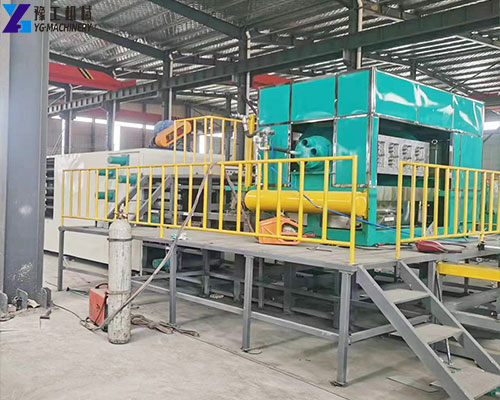
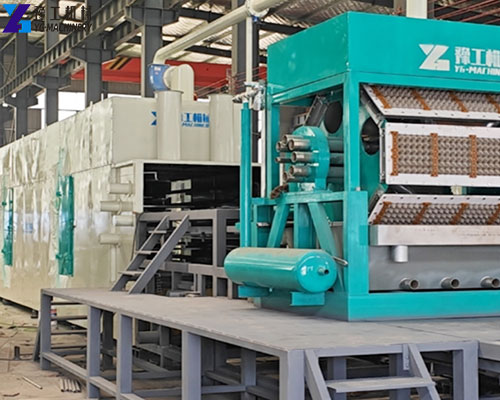
Comprehensive Comparative Analysis of Pulp Egg Tray Making Machine VS Plastic Egg Tray Making Machine
Cost Comparison Analysis of Pulp Egg Tray Making Machine vs. Plastic Egg Tray Making Machine
| Cost Dimensions | Pulp Egg Tray Making Machine | Plastic Egg Tray Making Machine (Plastic Molding) | Cost Advantage Analysis |
| Raw Material Costs | Very Low. The main raw materials are recycled fibers such as waste paper, old newspapers, and waste cardboard boxes. These are widely available, and their prices fluctuate little and are generally lower than those of plastic raw materials. | High cost and highly volatile. Main raw materials are plastic pellets (such as PVC, PET, PS), and prices are greatly affected by fluctuations in the international oil market. | Pulp molding offers a significant cost advantage in raw materials. |
| Equipment Investment Costs | High. Requires a pulping system, molding system, large-scale drying system (a major energy consumer), and molds. High initial investment. | Medium to high cost. Main equipment includes injection molding machines or thermoforming machines, and molds. The equipment is small in size and does not have large drying ovens. | Plastic equipment requires less floor space and lower energy system investment. |
| Operating and Maintenance Costs | Medium-High. The main consumption factors are:
1. Heat energy (drying oven), which is the main energy consumption. 2. Water (requires recycling); 3. Mold wear. |
Low to medium cost. Main consumption includes:
1. Electricity(injection/heating); 2. Cooling water; 3. Mold maintenance is simple and easy to clean. |
While energy consumption in plastic machinery is primarily concentrated in electricity, the heat energy consumption of pulp machines is the core issue. |
Environmental Comparison Analysis of Pulp Egg Tray Making Machine vs. Plastic Egg Tray Making Machine
| Environmental Dimensions | Pulp Egg Tray Making Machine | Plastic Egg Tray Making Machine (Plastic Molding) | Environmental Advantages Analysis |
| Raw Material Sources | Excellent. 100% uses renewable and recyclable waste. A form of waste recycling. | Poor: Relies on petroleum-based raw materials, which are non-renewable, and involves chemical polymerization in the production process. | The raw material sourcing of pulp molding offers significant environmental advantages. |
| Degradability | Excellent. 100% biodegradable, typically decomposing completely in the natural environment within weeks to months. | Very Poor: Difficult to degrade, becoming “white pollution,” requiring hundreds of years to form. | Pulp pallets fully align with sustainable packaging trends. |
| Production Pollution | Low to Medium. The main pollution is production wastewater, but modern pulp egg tray making machines use a water recycling system of over 95%, resulting in minimal pollution. | Medium-High: Involves heating, melting, injection molding, or thermoforming of plastics, producing air pollutants such as VOCs (volatile organic compounds). | The environmental impact of pulp molding during the production process is more controllable. |
| Recycling | Excellent. It can be returned to the pulp egg tray making machine production line as raw material, achieving a closed loop. | Poor: Plastic trays are typically only recycled for types such as PET/HDPE; recycling PVC/PS is costly and difficult. | Pulp recycling systems are more mature and economical. |
Durability Comparison Analysis of Pulp Egg Tray Making Machine vs. Plastic Egg Tray Making Machine
| Durability Dimensions | Pulp Egg Tray Making Machine | Plastic Egg Tray Making Machine | Durability/Functionality Analysis |
| Protective Performance | Excellent. Pulp molding offers excellent shock absorption and cushioning elasticity, providing superb protection for eggs. | Good. The structure is reasonably designed, but it may fracture under extreme impact. | The fibrous structure of pulp provides natural shock absorption. |
| Moisture Resistance | Poor. Easily absorbs moisture and softens in wet or high-humidity environments, affecting strength and shape. Requires an additional waterproof coating or a pulp waterproofing agent. | Excellent. Completely waterproof and moisture-proof, suitable for refrigeration or high-humidity environments. | Plastic pallets perform more stably in cold chain and high-humidity environments. |
| Reusability | Average. Suitable for single-use or limited reuse, as strength decreases with humidity and time. | Good. Typically designed to be washable and reusable, but cleaning and sterilization costs apply. | Pallets produced by Plastic Egg Tray Making Machines are better suited for scenarios requiring multiple turnovers. |
| Transparency | None. The pulp material is opaque, making it impossible to observe the condition of the egg inside directly. | Excellent. The PET/PVC material has high transparency, making it easy for consumers to inspect eggs. | The visual inspection advantages of plastics are more favored by the retail market. |
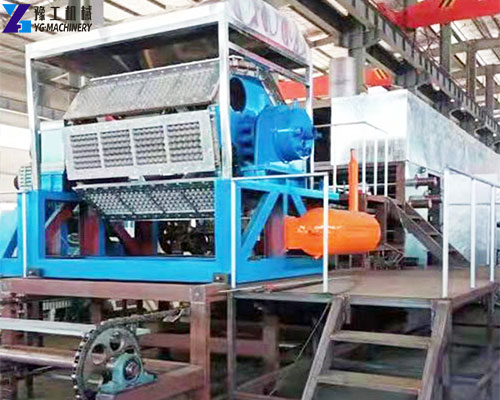
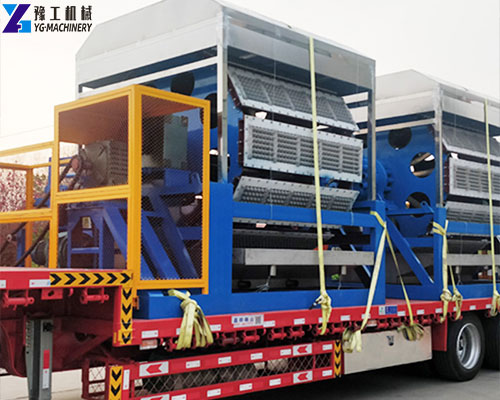
Which Is the Best Investment Choice: A Pulp Egg Tray Making Machine or a Plastic Egg Tray Making Machine?
| Conclusion: Which is the best choice? | Pulp Egg Tray Making Machine | Plastic Egg Tray Making Machine |
| Key Advantages | It boasts overwhelming advantages in environmental friendliness and raw material costs, making it particularly suitable for markets with high environmental requirements and readily available raw materials (waste paper). | More durable and moisture-resistant, suitable for cold chain environments or scenarios requiring high-frequency reusability. |
| Investment Recommendations | It is ideal for companies seeking large-scale, centralized production, low operating costs, and an environmentally friendly brand value. While initial investment costs are high, long-term raw material costs are extremely low, resulting in a stable return on investment. | Suitable for small-scale production or focusing on niche markets requiring durable, transparent, and waterproof packaging (such as high-end supermarkets or export cold chain). |
Apple Tray Making Machine Manufacturer – YG Machinery
With tightening global environmental policies and increasing consumer awareness of green consumption, the packaging industry is accelerating its transformation towards “low-carbon, high-efficiency, and multi-functional” solutions. Traditional high-energy-consuming and high-polluting packaging equipment is gradually being phased out by the market. The YG apple tray making machine, using environmentally friendly raw materials, boasts a zero-pollution production process and biodegradable products, perfectly aligning with the goal of “carbon neutrality.” Its application scenarios in the fruit, food, and gift industries will continue to expand in the future. It is automated and intelligent, and compatible with egg packaging machines, meeting diverse production needs and reducing equipment investment costs. Geographically, Europe’s stringent requirements for environmentally friendly packaging make this equipment a necessity for local businesses; the rapid development of the Southeast Asian fruit export industry has led to a growing demand for high-efficiency packaging equipment; and the North American market’s preference for customized packaging can be met through the machine’s mold-changing function. It is foreseeable that the YG egg tray product machine will occupy an important position in the global packaging industry’s transformation. For forward-thinking companies, introducing this equipment now not only solves current production challenges but also allows them to position themselves for the future market strategically. Leveraging its environmentally friendly and efficient core advantages, it enables them to stand out in industry competition and become a leader in the packaging field. Contact us now.【WhatsApp/WeChat/Phone/Skype】+86 136 1385 6800
![]()


